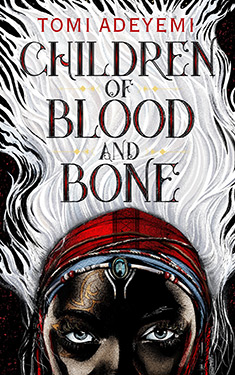Tomi Adeyemi
Completed 10/6/2020, Reviewed 10/6/2020
3 stars
In Orisha, the monarch has eradicated
magic from the land and killed all the wielders of magic above the age of
thirteen. Called maji, they’re
recognizable by their white hair. Those
under the age of thirteen, though white-haired, haven’t acquired their powers
yet, so are considered not dangerous. Zelie
lost her mother to the Raids and is rightfully bitter. She has white hair and has the potential to
be a maji. Several years after the Raids,
she becomes involved with bringing magic back when the Princess steals an
artifact from her father that can return magic to the land. Zelie, her brother, and the Princess take up
the artifact and begin the quest to bring magic back. Hot on their heals is the Prince, who
supports his father’s vision of a magic-free land.
The book is told from first person point of view by Zelie, the Princess, and the Prince in alternating chapters. This form develops their characters really well. Zelie is a great character. She’s well-rounded despite being bitter over the death of her mother and the Raids which killed all the maji of age. She‘s strong, having been trained to defend herself like many of the young girls of her village. The Princess is also strong and fierce, having been trained by her father to defend herself in case of an uprising, like the one in which he lost his first family. She struggles with the injustices perpetuated on the maji which emboldens her to steal a scroll which when touched, restores magic to them. The Prince, despite being the antagonist, is also a well-developed character, getting his own narrative.
Though the characters are strong, the story feels hackneyed. That’s not saying it’s not exciting, because it is. It just feels like it’s been done before. But the story is well paced, and I often found myself having a hard time putting the book down at several points. There’s a lot of action and a lot of sequences that are real page turners.
The one thing I really liked was the realness of the oppression the maji suffered at the hands of the royal guards. They called them maggots and were heavily taxed. What they endured was very realistic and often hard to read. The account of the death of Zelie’s mother is particularly difficult. It’s an excellent handling of xenophobia and the demonization of the other. Contrary to the belief of the king, it doesn’t protect him, it merely incites resentment and ultimately violence.
I give this book three stars out of five. I really liked it, and would have liked to have given it four stars. But ultimately, it felt derivative of other YA novels. I do highly recommend the book though. It is a good read and satisfying despite the cliffhanger at the end. And one more plug. The cover art of this book and its sequel is tremendous.

No comments:
Post a Comment